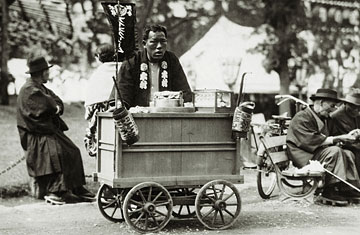
A candy vendor in Kyoto, circa 1950
In a dark alleyway not far from the bustle and glare of Tokyo's Shibuya district, smoke smelling of scorched starch spirals from a wood-burning stove set in the bed of a small truck. A sonorous ditty coming from a horn on the roof announces the arrival of something that seems oddly ancient in a city that often feels futuristic: the sweet-potato vendor.
Until the late 1970s, vendors of all stripes tramped Tokyo's streets, armed with goods and a gimmick. The caramel-candy man told tales; the frog-oil man rapped; the herb seller dressed like a hermit. Most are now gone, replaced by 24-hour convenience stores and complex vending machines, but Table-Mono, a company that peddles healthy tofu products, has revitalized the once fading industry. Table-Mono sellers blow a catchy tune on toy trumpets and cater to both a housebound and nostalgic elderly population and a younger group who are health-conscious and in a hurry.
"People today want good food, but they want it on their terms," says Elizabeth Andoh, an American who moved to Japan in the mid-1960s and has authored several books on Japanese cuisine. "These mobile shopkeepers have found a very good match with the customer base."
Street vendors first appeared in Japan four centuries ago, when the Edo shogunate issued special vending passes to merchants who could not afford a storefront. The practice was briefly suspended during World War II when food was rationed, but in the decades that followed, street vending, catering to a new generation of housewives who embraced eating fresh local foods, blossomed. Then, in 1970, an international food expo held in Osaka introduced Japan to coffee and hamburgers. Chain restaurants and all-night supermarkets opened in step with the nation's booming economy and food vendors fell by the wayside.
The ones that survived offer something no store can. "The sweet-potato vendor conveys the feeling of winter," says Seiko Yamazaki, who researches consumption trends at the Dentsu Institute, part of the Tokyo-based ad agency. "You hear his song and it makes you feel warm. You imagine eating this piping hot potato."
Table-Mono has a gimmick too: a troupe of charming 20-something vendors. The company, founded in 2003 with a handful of sellers hawking mainly tofu, now dispatches 100 vendors into the different parts of Tokyo each day, selling everything from fermented beans and tofu pudding to soy-milk soup and tofu for pets. With wooden carts stacked high with turquoise crates, and a signature two-note trumpet call, the sellers stand out. Many of them moonlight as artists, and they are encouraged to develop their own vending persona. "Customers want to talk to a real person," says Kakinuma Daisuke, a Table-Mono financial officer. "At supermarkets, you are pushed through a queue and then must deal with the cash register; no one has time to talk."
Particularly keen on conversation are the elderly, who account for more than one-fifth of the Japanese population and are increasingly living alone. Customers 65 and up make up a majority of Table-Mono's business. "This is one of the main reasons for [Table-Mono's] success," says Yamazaki. "Many older people can't walk to the supermarket; some have no friends and stay alone in the house all day."
On a cold, drizzly day, Kitaro Matsumoto, a 27-year-old Table-Mono vendor, pulls his cart down a side street in the riverside Kachidoki neighborhood. He wears a blue bandana, a yellow slicker and purple pants and he toots a plastic gold trumpet, Paa-puu, Paa-puu.
At an intersection Matsumoto sells a young mother soy milk and then he delivers eight packs of tofu to an elderly woman at her flower-lined house. Down the street, a fashionable young couple purchases tofu paste, tofu soup and a bag of tofu puddings, then excitedly snaps a photo with Matsumoto. "Rainy days, sunny days, I don't care," he says. "Business is always good."
Sadly, that's not the case for an aging sweet-potato vendor in the residential Ushigome neighborhood later that night. Wanting to remain anonymous, the seller does not give his name, but says he works 12 hours a day, seven days a week and barely makes enough to cover the costs of equipment rental and fuel. "It's a hard life," he says, and climbs back into his truck. He inches up the alleyway, passing a pair of glowing vending machines. The prerecorded sweet-potato song streams into a chilly night sky: "Yakiimo, yakiimo, hokka hoka no yakitate" (Sweet potatoes, sweet potatoes, fresh from the oven).
